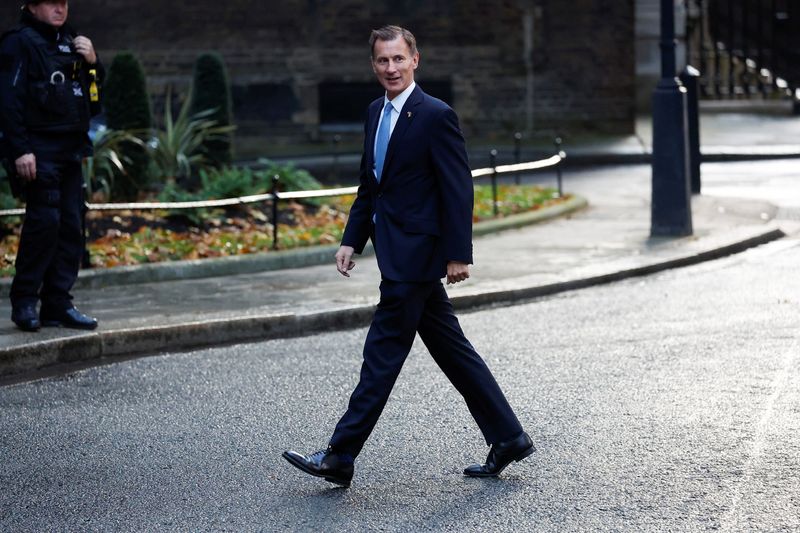By William Schomberg
LONDON (Reuters) – Newly confirmed finance minister Jeremy Hunt must keep investors calm about Britain’s debt mountain, avoid causing a deep recession and work out a way to stop the Conservative Party from splintering again – and all of it by next Monday.
Hunt, re-appointed to his job by new Prime Minister Rishi Sunak on Tuesday, is due to announce a budget plan on Oct. 31.
The two men hope it will bury Britain’s recent economic policy experiment under former leader Liz Truss that triggered a historic bond market slump and made Truss the shortest-lived prime minister in history.
Hunt, a former foreign and health minister, was rushed in as Truss’s new finance minister after she fired her friend and fellow low-tax disciple Kwarteng less than two weeks ago in a bid to appease the markets.
Hunt immediately ripped up Truss and Kwarteng’s programme, reversing most of its 45 billion pounds of tax cuts, and he warned of tough decisions ahead to restore Britain’s economic credibility.
A sharp fall in borrowing costs over the past week — 30-year government bond yields fell on Tuesday to their lowest since the day before Truss’s “mini-budget” — has made that job a bit easier by reducing the government’s debt interest bill .
Charlie Bean, a former top official at the Office for Budget Responsibility watchdog, said the calmer markets meant Hunt and Sunak faced a hole in the public finances closer to 30 billion pounds a year than 40 billion pounds a couple of weeks ago.
But the scale of the problem remains huge, with health, education and other public services in Britain under huge strain after more than a decade of tough controls on public spending. At the same time, many Conservatives oppose tax increases.
“The crucial thing will be whether Conservative MPs – who are now all talking about unity – when it comes to actually being faced with measures they don’t like, are they going to support them or are we going to see them reverting to the chaotic infighting we’ve seen recently?” Bean told the BBC.
Tensions within the Conservative Party have run high since the 2016 decision by voters to leave the European Union and led to the ousting of Truss and Boris Johnson as leaders this year.
TOUGH DECISIONS
Big budget decisions for next week: whether to revive the social security hike introduced by Sunak when he was Johnson’s finance minister and which was ditched by Truss; whether to signal future income tax cuts as Sunak promised in his failed summer Downing Street bid; and where to cut public spending.
The severe cost-of-living crisis caused by 10% inflation is also putting pressure on the new government to raise welfare and pensions by double-digits too, while pay strikes are breaking out across the public sector.
Just as important in the short term, Hunt and Sunak must decide what to do with Britain’s hugely expensive energy price cap for homes and businesses.
Hunt has cut the duration of the scheme to six months – which will still cost an estimated 60 billion pounds – from the two years promised by Truss. But he has yet to say how he will honour his pledge to protect the most vulnerable after April.
The cap’s future will be key for the Bank of England as it prepares to raise interest rates again on Nov. 3 when it will also signal its plans further ahead.
The combination of higher energy bills from April, more rate hikes and a slower world economy means Britain could be in recession until the end of next year, economists say.
Ratings agency S&P Global Ratings forecast on Tuesday that Britain’s economy would contract by 0.6% in 2023.
Faced with that bleak outlook, the head of a big employers’ groups urged Hunt and Sunak not to return to the relentless focus on spending restraint and tax measures of the 2010s under the Conservatives, and to announce pro-growth measures.
“The country could end up in a similar doom loop where all you have to do is keep coming back every year to find more tax rises and more spending cuts because you’ve got no growth” Confederation of British Industry Director General Tony Danker told BBC radio.
(Writing by William Schomberg, Editing by William Maclean)
